The Research Data and Metadata Standardization Task Force Survey Results
In September 2025, the University of California, San Francisco (UCSF) Research Data and Metadata Standardization (RDMS) Task Force, chaired by Michael Oldham, PhD and established by the UCSF Academic Senate Committee on Library & Scholarly Communication (COLASC), released the findings of the 2025 UCSF Research Data and Metadata Survey Report. The survey gathered critical insights from UCSF investigators across disciplines to better understand current practices and challenges in research data production, metadata annotation, storage, sharing, and reproducibility. With 181 respondents representing all UCSF schools, departments, and centers, this report underscores the need for transformative action to align UCSF’s data practices with modern standards for open and reproducible science.
Why This Matters
UCSF investigators produce vast amounts of research data annually, representing an enormous yet underutilized resource. Inconsistent data organization and incomplete metadata annotation hinder effective search, reuse, and aggregation of datasets—critical components of scientific progress. These gaps also contribute to challenges in reproducing published analyses, a growing concern in the research community. As funders, journals, and the public increasingly demand open access to well-structured datasets, UCSF has the opportunity to lead the way in developing robust standards for research data and metadata management.
Survey Highlights: Key Findings and Challenges
Who We Engaged
A total of 181 individuals completed the survey. The majority of respondents were faculty members (79%), with most holding the rank of Full Professor (59%). Respondents were primarily affiliated with the School of Medicine (67%), followed by the School of Nursing (11%) and the School of Pharmacy (6%).

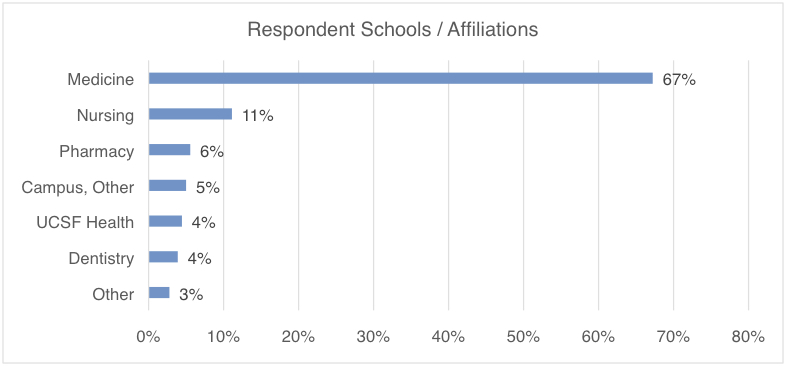
Metadata Practices and Standards
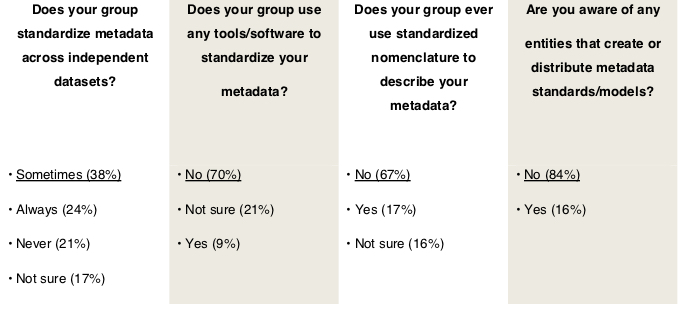
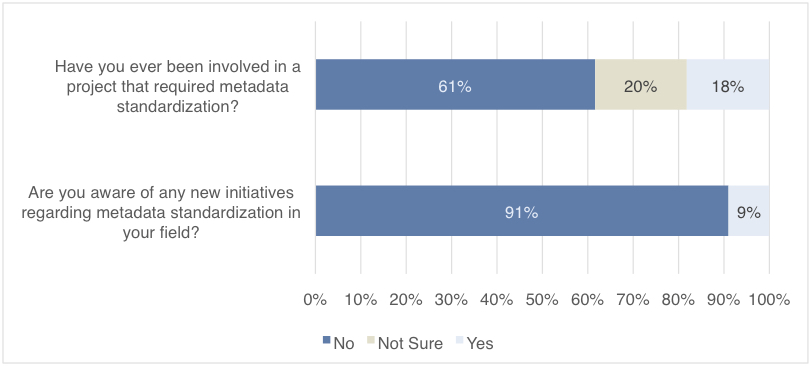
These results indicate that metadata standardization isn’t common practice at UCSF. Moreover, most respondents are unaware of existing standards for metadata annotation. Thus, even when groups make efforts to standardize their metadata, different groups use different strategies.
Research Data Storage, Backup, Sharing, and Discovery
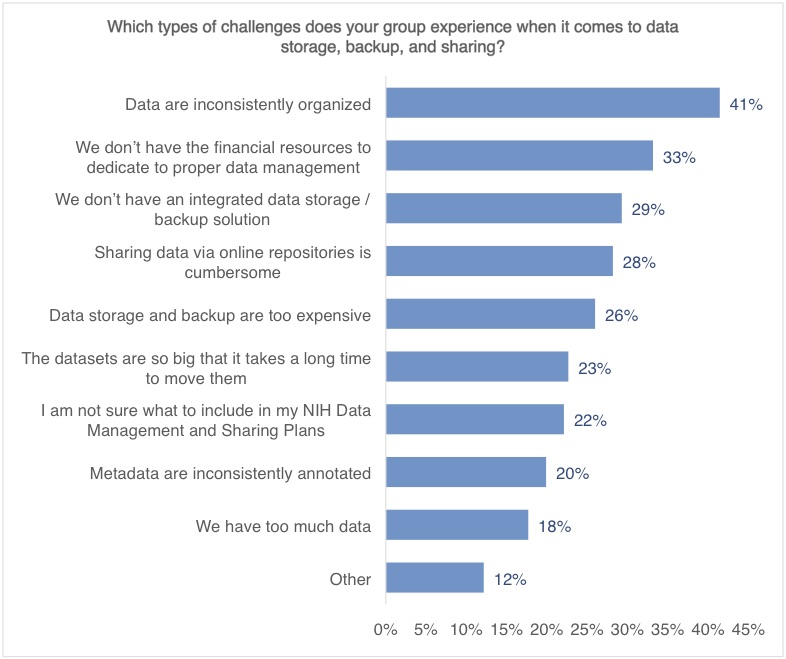
Many respondents noted that the most prominent challenges their group experiences when it comes to data storage, backup, and sharing are that data are inconsistently organized, labs don’t have the financial resources for proper data management, and labs don’t have an integrated data storage/backup solution.
When UCSF investigators were asked how they monitor scientific developments and identify new research datasets of interest, few indicated that they search data repositories.
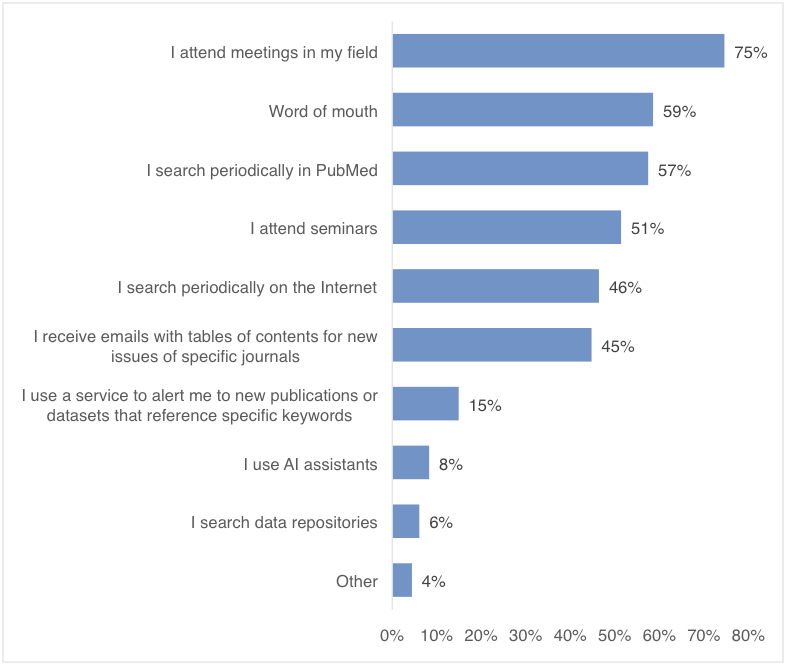
This finding reflects the poor search capabilities of most data repositories, which typically do not standardize metadata and cannot perform complex queries to identify research datasets with specific attributes.
Reproducibility, Open Science, and Related UCSF Activities
Most UCSF investigators aren’t aware of UCSF efforts to promote open science, and most aren’t sure if UCSF is adequately addressing the topic of research reproducibility. Conversely, most believe there to be a reproducibility crisis and majority think that UCSF should support open science.
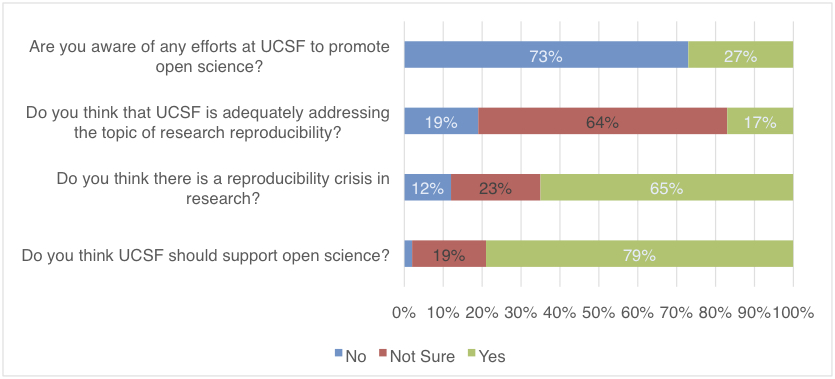
A Community Call for Action
Respondents shared thought-provoking comments highlighting the urgency of addressing these challenges:
“UCSF should offer central support for data efforts in exchange for better data sharing across research units.”
“Biology is becoming more and more computational, and datasets are only getting larger. We need new technology infrastructure to meet the moment and enable real-time, collaborative, and ongoing analysis of large and complex datasets that is guaranteed to be reproducible.”
This feedback reflects a deep desire for UCSF to lead the charge in designing forward-looking solutions that support open, reproducible, and FAIR (Findable, Accessible, Interoperable, Reusable) science.
Conclusion
In summary, metadata standardization is uncommon, with most respondents unaware of existing standards or tools, leading to inconsistent practices across groups. Data storage and sharing face hurdles such as financial constraints, lack of integrated solutions, and poor organization, while limited search capabilities in repositories hinder dataset discovery. Furthermore, investigators expressed concerns about a reproducibility crisis and insufficient UCSF support for open science, emphasizing the need for centralized solutions to enable collaborative, reproducible, and FAIR science.
Next Steps: Building the Future of Data Management
The RDMS Task Force is committed to addressing these challenges and advancing UCSF’s leadership in data management. Planned next steps include:
- Pilot Projects: Developing standards for data packaging and metadata annotation to guide research groups in organizing their datasets for sharing and reuse.
- Policy Recommendations: Preparing a comprehensive report for UCSF leadership, including the Office of the Executive Vice Chancellor & Provost (EVCP), the Office of Research, and the Academic Senate.
The RDMS Task Force invites the UCSF community to engage with this effort and share feedback to help shape the future of data management practices at UCSF. For questions, comments, or to learn more, please contact Dr. Michael Oldham at [email protected].
Sincerely,

Michael Oldham, PhD, Chair
UCSF Research Data & Metadata Standardization Task Force
